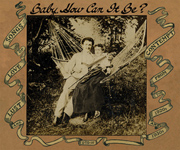|
|
 |
Dusted Reviews
Artist: V/A Album: Baby, How Can It Be? Label: Dust-to-Digital Review date: Jan. 12, 2011 |

|
|
|
 |
We may be descended from the folks that made the music on Baby, How Can It Be? We may share some of their priorities; these three discs of music sourced from 78 RPM records released in the U.S. during the 1920s and 1930s is organized according to the themes of Love, Lust, and Contempt, concerns as contemporary as the latest episode of XXX.
But they aren’t quite like us, and part of the charge that emanates from a compilation like this derives from its blend of familiarity and exoticism. Dudes may still want to hang out later at the bar, like the protagonist of the Carolina Buddies’ “He Went In Like A Lion (But Came Out Like A Lamb),” but a woman’s no longer limited to either taking his abuse or bouncing coffee cups and records off his dome. Even if they come out snarling, the women in these songs have a caged quality that reminds you that things really are different now.
As ways go, so go signifiers; nowadays, no one’s pulse is likely to be quickened by children’s toy metaphors like the yo-yo trade described on Hartman’s Heart Breakers’ “Let Me Play With It.” The cod-Polynesian singing that rendered several of these songs exotic back in the day has lost its ability to make you imagine faraway places where the weather and sexual mores are a lot warmer. And the faux-horn scatting on Ukelele Ike’s “If You Can’t Land ‘Er On The Old Veranda” doesn’t have much traction in an era when you can sample voices with a cell phone.
But if some of these tunes sound quaint, others are pretty universal. The Virginia Four’s “I’d Feel Much Better” and Harry Roy And His Bat Club Boys’ “Pussy” are built around double entendres as single-minded and un-mysterious as R. Kelly’s thoughts after a shellfish buffet at a girl’s school; the longing for emotional merger given voice on Fletcher Henderson’s “Then I’ll Be Happy” is still driving plenty of people into bad relationships today.
One quality makes this set feel as contemporary as the latest mix of mp3s you downloaded from your buddy; it’s seriously short on context. Sure, you’ve got some vintage photos on the digipak and in the booklet, but it’s grievously short of the annotation that makes Fonotone Records: Frederick, Maryland (1956-1969) a
key unlocking a hitherto hidden past or The Anthology Of American Folk Music feel like a coded communication changing our notions about times before we were born. You’re on your own, for example, if you want to find out who played the hot tenor sax solo on “Then I’ll Be Happy” (my research suggests that it’s Coleman Hawkins), or if you’re curious how popular the Mississippi Sheiks were, or any other sort of record collector lore. The only nods to such geekery are Heneghan’s plea for records and Robert Crumb’s done-it-in-a-minute centerfold illustration. After you get past the organizing themes for each CD, this is really just a swell bunch of songs.
By Bill Meyer
|







